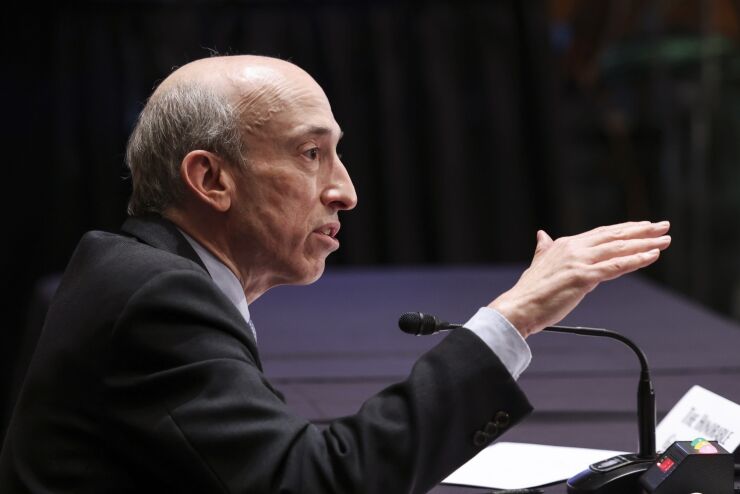WASHINGTON — The Securities and Exchange Commission voted Monday to propose a rule that would require publicly traded companies to disclose a broad array of climate-related exposures, including a firm’s carbon emissions across its value chain.
The proposal, which exceeds
The disclosures required under the proposed rule would include a firm’s big-picture climate risks, such as those from societal energy transition, as well as a wholesale calculation of the firm’s environmental impact and greenhouse gas emissions. Publicly traded companies would also be required to explain their governance procedures around climate risk, including the company’s “processes for identifying, assessing, and managing climate-related risks,” according to a

In his opening remarks, SEC Chair Gary Gensler argued that despite the disclosure rule’s somewhat novel subject matter, the agency has a history of stepping in “when there’s significant need for the disclosure of information relevant to investors’ decisions.”
“If adopted," the climate disclosure proposal "would provide investors with consistent comparable decision-useful information for making their investment decisions and would provide consistent and clear requirement obligations for issuers,” Gensler said.
On greenhouse gas emissions, the disclosures would include a firm’s direct emissions, indirect emissions in the form of purchased energy, and emissions from “upstream and downstream activities in a registrant’s value chain” — otherwise known as Scope 1, Scope 2, and Scope 3 emissions, respectively.
The inclusion of Scope 3 emissions in the SEC’s climate disclosure rule could rankle large banks, which have for years expressed concern that such a requirement could carry a massive reporting burden if
Under the proposal, firms would be required to disclose Scope 3 emissions if they are “material,” adding that the purpose of including Scope 3 emissions in the reporting requirements is to allow investors to “determine and compare how exposed a registrant is to the financial risks associated with a transition to lower-carbon economy.”
But the proposed rule acknowledges that the disclosure of Scope 3 emissions may be a daunting endeavor, and SEC said its regime would likely also include a safe harbor provision to mitigate the costs and uncertainties in reporting Scope 3 exposure.
“Depending on the size and complexity of a company and its value chain, the task of calculating Scope 3 emissions could be challenging,” the SEC stated in its proposed rulemaking.
As a result, the SEC’s disclosure framework as proposed would include a safe harbor “from certain forms of liability under the Federal securities laws,” exempt smaller reporting companies, and have a delayed compliance date — as late as 2025 for large companies and 2026 for others.
The SEC board, governed by three Democrats and one Republican, voted along partisan lines to approve the proposal. Stakeholders will have 60 days after the rule’s publication in the Federal Register to provide feedback.
Democrats, including Gensler, framed the rulemaking as a crucial development for investors seeking greater corporate transparency on firm’s preparations for and response to climate risk.
“Consider, for example, parachuting from a plane,” said SEC Commissioner Allison Lee. “Would you be content to hear that a review shows nothing to indicate a problem with the chute? Or would you instead want to know that the chute has been examined and found to be sound in all material respects?”
Gensler noted in his remarks that “investors representing $130 trillion in assets under management have requested that companies disclose their climate risk.”
Sen. Jack Reed, D-R.I., a member of the Senate Banking Committee, said the proposal is an important first step in allowing markets to accurately assess publicly traded firms’ climate risks and price their value accordingly.
“There’s an old saying in business: What gets measured gets managed,” Reed said. “The SEC’s enhanced disclosure proposal will ensure companies disclose their climate-related risk and emissions information in a consistent, standardized way that is directly relevant to investors’ ability to make sound investment decisions.”
The commission’s lone Republican, Hester Peirce, issued a lengthy dissent of the proposal, arguing that the SEC was exceeding its statutory authority. She also dismissed the value of the potential disclosure regime, given the potential unreliability and inconsistency of the information that may be provided.
“The desire to bring clarity in an area where there has been a lot of confusion and greenwashing is certainly understandable, but the release mistakenly assumes that quantification can generate clarity, even when the required data are in large part highly unreliable,” Peirce said. “The results won't be reliable, let alone comparable across companies, or even consistent.”
Pierce’s complaints were echoed by Republicans across Washington on Monday. House Financial Services committee ranking member Patrick McHenry, R-N.C., said that action on climate change should be pursued by Congress rather than regulators.
“The SEC’s proposal to require disclosure of information related to climate change that is not material for most companies is tone-deaf and misguided,” McHenry said. “I have long recognized the threat climate change poses to communities across America, and thoughtful climate policy — focused on the health and welfare of America’s working class — is long overdue. However, it is Congress’s job to set our environmental policy, not ill-suited and unelected bureaucrats.”





